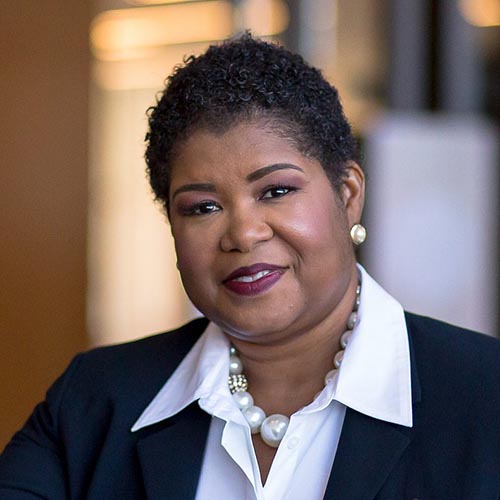Cassandra Willis: A father's sacrifice; a daughter's calling

Cassandra Willis grew up in Richmond, Virginia, during a time when limited citywide busing was being used as a means to desegregate Richmond Public Schools. The first in her family to attend college, Willis earned her bachelor’s degree from the University of Virginia, her master’s degree from the VCU School of Education, and expects to earn her Ph.D. in Education with a concentration in Special Education and Disability Leadership this May in SOE’s Research to Policy Advocacy program.
What drew you to the field of education?
Back in the 1970’s, African-American children in my Highland Park neighborhood were being bused to Mary Munford Elementary School in the western part of the city. My father didn’t want me to be caught up in that political tension. He wanted me to get the best education possible. He talked to some of his friends whose children were in Catholic schools and made the decision – the sacrifice, really – to send me to Catholic schools from preschool all the way through high school. I went to Holy Rosary Catholic Church, St. Patrick’s Grade School in Church Hill and Marymount High School. I attended the University of Virginia for my undergraduate degree.
I was the only African-American student in the special education program when I was at U.Va. Partly because I had a very good education when I was growing up, I recognized that everyone else should have a good education, too. As a teacher, I believed that I could provide that. It felt like it was my calling, and I believed that I belonged to the community that needed it. Many years later, here I am.
When you applied to graduate school, what made you choose VCU SOE?
My family lives in Richmond, as does my husband’s family. We had just gotten married when I started my master’s program at SOE. By the time I finished the program, I was pregnant with our first child. Moving has never really been an option for us. After getting my master’s degree here, I knew that SOE had the programs I wanted. I didn’t look anywhere else.
Any highlights from your most recent semester?
One big highlight was when I received the 2018 Jane West SPARK Award at the Teacher Education Division of the Council for Exceptional Children Conference in November 2018. It’s named after Jane West, a national leader in advocating for disability policy and special education. She’s also an adjunct professor at VCU SOE, and she teaches the policy portion of our RTPA (Research to Policy Advocacy) program.
I was fascinated with Dr. West from the very first session I had with her. After that class, I went on Amazon and ordered lots of Basic Government 101 books to help me understand the terms that she was using. She recognized my interest, took me under her wing, and introduced me to places and people that I would’ve never had access to otherwise. It was so special to win an award that’s named after someone I admire so much and who is so entrenched in my field of interest.
What would you like to do with your doctoral degree?
I’m currently looking at three options: 1) returning to work for a school division; 2) entering into the policy arena; or 3) pursuing a position in higher education. It may come down to whoever offers me a job. It will be nice to have some options – without the doctoral degree, my only option would be the first one.
Any tips for incoming students?
Build your own village and don’t isolate yourself. You will get support from VCU, from the School of Education and from your doctoral adviser, but nobody knows you like you do. I’ve received support from the school and from my advisor, Dr. LaRon Scott, but I’ve also formed my own support group consisting of peers outside of my program, professors and deans across the country, family members and girlfriends. The school can’t build these systems for you.
You also have to understand your own strengths and weaknesses, and then build your network of support accordingly. Every student in the doctoral program is smart – it’s one of the first things I learned – but the successful ones are the ones who are disciplined and persistent. Your network will help you stay focused.
What do you do to relax?
Before I began my doctoral program, I would read, hang out with friends and travel. Because my time is more limited now, I relax by getting into whatever my kids are into. Lately, it’s a TV show called “The Masked Singer.” Since it’s on too late for the kids, we tape it and watch it on Friday nights together.
As much work as a doctorate is, one of the positives has been being able to be more present and more active with my kids. No matter how many hours I work each week, at least I can choose when I work in a doctoral program. That’s been nice.